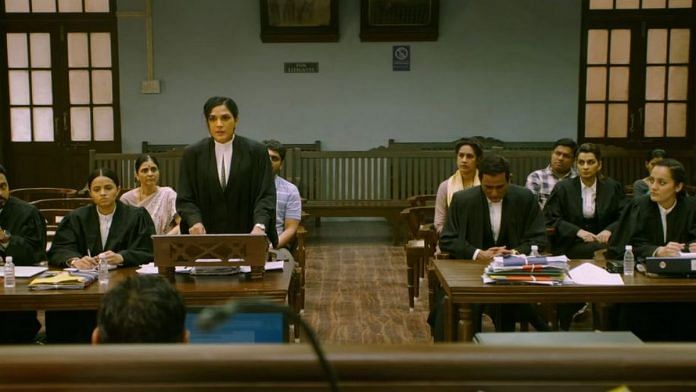New Delhi: “Justice is abstract, law is a fact,” says Tarun Saluja at a law school event. Saluja (Akshaye Khanna) is introduced as Senior Advocate, High Court — which one is not specified, a fact that sticks out in a movie that otherwise seems to take its legal research seriously.
He is all about the law, the fact that everyone, even a rapist, has the right to a defence lawyer, and the idea that law and justice are two different things. This last is something his junior, Hiral Gandhi (Richa Chadha), can’t abide, and was why she left his chamber.
The two meet in court on opposing sides when a major film director, Rohan Khurana (Rahul Bhat), is accused of raping his junior costume assistant, Anjali Dangle (Meera Chopra). A sessions court has already convicted Khurana, based on forensic evidence including fingernail scrapings and the presence of semen and pubic hair in Dangle’s private parts that matched Khurana’s. The wife of the accused asks the well-known Saluja to take on the case and appeal, while Gandhi is the prosecutor.
What follows is an intense courtroom drama with the rape scene presented in multiple ways, depending on who is speaking, and with the usual suspects of glaring lapses in police work and the defence’s claims of a consensual relationship gone wrong and the woman filing a complaint in revenge.
Saluja, the consummate legal eagle, manages to make those in the courtroom and in the audience question the woman’s testimony almost entirely through rhetoric, questionable tactics and very little evidence. Each hearing raises fresh doubts and the case, when concluded, leaves the audience undecided about who actually won. This is where the script scores.
This is also where it gets problematic. Saluja, the male lawyer, is given all the clever quips, while Gandhi is saddled with being earnest and emotional — you know, because she’s a woman. Sent from my stereotypewriter.
What also sticks out is that Saluja’s personal life — his rock-solid marriage (even though his wife doesn’t want him to defend a convicted rapist), his reason for taking on high-profile cases like this (because they enable him to do his pro bono work, thus establishing his goodness of character) — is given ample screen time, but Gandhi’s is non-existent. Her story and dialogue are poorly fleshed out, and she comes across as a one-note character, though Chadha plays her with the right amount of passion and empathy. This laziness is also evident in the way protesters (now an integral part of any movie about an urban rape case) are portrayed entirely as a kangaroo court screaming for the rapist to be hanged — there is no nuance, and the few who speak to the media only spout clichés. If this is how the director sees the anguished protest of a country that has simply had enough of crime against women, it’s a problem.
Chopra and Bhat, though at the root of the trial, are actually not the main players, as their story is used to make a larger point and raise larger questions — about law and justice, and of what use the former is if it doesn’t lead to the latter. And Khanna, as the lawyer caught between the two, is excellent. The difference between the progressive man he is at home and the slimy lawyer he is in court is well-etched and authentic — we all know those men who will endlessly cite the number of false rape cases, however minuscule that is, to lament how the misuse of the law is a disservice to the many more genuine cases.
Section 375 is extremely rooted in the current urban milieu — #hangtherapist trends online and there are multiple #MeToo references. And it is precisely this that makes one wonder why, when women are finally gathering the courage to speak out about the sexual harassment and assault they have faced for so long, filmmaker Ajay Bahl chooses to train his lens on the idea of a false case.
Of course, false cases do exist; of course, the gender-neutralisation of laws is an important conversation and of course, the filmmaker is free to make whatever film he chooses. But sitting in the audience, surrounded by men cheering and clapping and saying “Ya, exactly” whenever clever Saluja demolishes an argument by earnest Gandhi with no evidence beyond reasonable doubt to back up his claim of a false case, it makes one think that by championing men’s rights, by focusing on something that exists but is absolutely not a systemic problem, the film, however interesting and well made, is doing a disservice to women.
Also read: Chhichhore tackles a difficult issue with simplistic solutions but plenty of charm




The review by the print is quite anti men and is an attemo to malign the truth & the men speaking out courageously about the wrongdoings to them by women. It is not a disservice to women , rather a much required expose of the false accusation bubble that has been blown too much by media supporting accusers without any basis or evidence, while destroying lives of millions ofen in the world. Great movie and a great attempt to bring forth the burning but well hidden issue in our society.